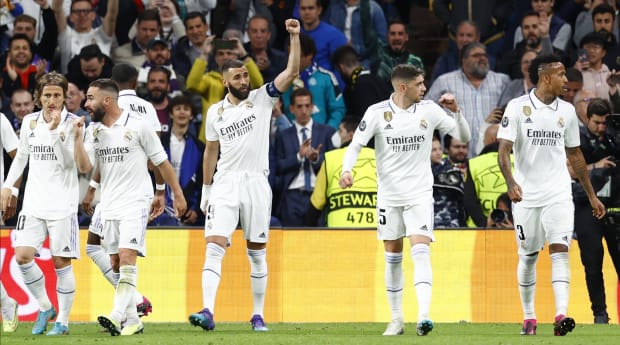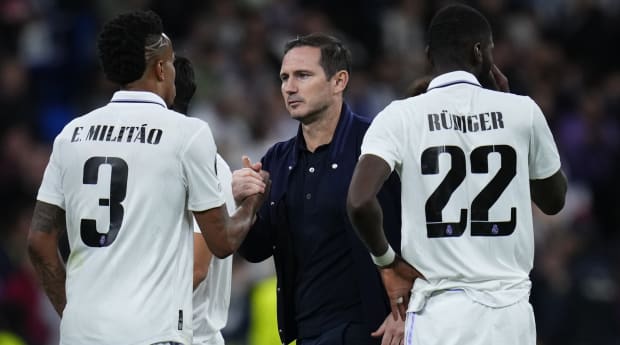The good news for Chelsea, and there wasn’t much at the Bernabéu on Wednesday night, is that it only lost 2–0. The Champions League quarterfinal is still, just about, alive, and it probably shouldn’t be. Real Madrid was so dominant, had so many chances, that it could have not only ended the tie but really embarrass Chelsea. Perhaps Carlo Ancelotti was showing pity to his former player, Frank Lampard, who has now lost 10 of his last 11 games as a manager.
Chelsea would have been an underdog, anyway, but it has to be asked what exactly Todd Boehly expected when he appointed Lampard as interim manager. Lampard had managed one Champions League knockout tie before, a 7–1 aggregate defeat to Bayern Munich. What reasonable expectation was there that he would be able to set the side up better than Graham Potter, whose one Champions League knockout tie had resulted in a 2–1 aggregate victory? Where Chelsea struggled under Potter was in chance conversion; there was far more reason to believe he could set up a team to contain the European champion than there was to have faith in Lampard, whose defensive capacities as a coach have always been questioned.

IMAGO/Lagencia
The only logic in sacking Potter when Chelsea did was to improve its chances against Madrid in the Champions League. It’s very difficult to see how anybody other than a Chelsea fan still infatuated with his capacities as a player could believe Lampard would do that. Boehly has talked since his arrival as Chelsea co-owner of the importance of research and long-term planning yet, if British media reports are to believed, he appointed Lampard after a conversation with television personality James Corden, who is as of yet unrecognized for his footballing acumen.
Then, there is the question of what Lampard thinks his job is. Given the Champions League is the obvious—the only—priority in what remains of the season, Saturday’s Premier League fixture against Wolves should have been used to prepare the side for this game. Yet Lampard switched to a back four at Molineux before returning to the back three in the Bernabéu.
After the defeat to Wolves, Lampard said it was a “big task” and he “didn’t expect to solve everything in one day,” which sounds like what a long-term manager would say. But he is an interim manager. He’s not meant to be solving problems or instituting new shapes or new ways of playing. His job is just to coax the side through to the end of the season, restoring some sense of confidence and purpose. Yet on Saturday, Lampard acknowledged his team had lacked the necessary “aggression.” But that is precisely what it is his role to instill.
Although Chelsea had a couple of early chances on the break—against an opponent and in a stadium that, frankly, seemed almost to take victory for granted—against Madrid, it was remarkably open. So open, in fact, that Madrid had eight shots on target before halftime. No side has ever had more against Chelsea in the first half of a Champions League tie.
It was all very easy for Madrid. Karim Benzema put Madrid ahead in the first half, following in after Vinícius Júnior had been released by a simple ball over the top. That at least took some precision in the pass from Dani Carvajal. The move that led to Ben Chilwell being sent off for tugging back Rodrygo just before the hour was as simple as it gets. Marc Cucurella, who had come on for the injured Kalidou Koulibaly four minutes earlier, mysteriously stepped up as everybody else remained static so that when Fede Valverde, under no pressure, lofted the ball forward, Rodrygo was free to run behind the defensive line.

AP
From them on the only question was how big Madrid’s win would be. A simple corner routine—set plays have been a weakness throughout Lampard’s managerial career—led to Marco Asensio making it 2–0. That it did not increase its advantage seemed down only to the general sense of lassitude that hung over the whole event, the sense of an inevitable Madrid victory.
Madrid almost certainly will progress to the semifinal where it will almost certainly face Manchester City, as it did at the same stage last season. Where Chelsea goes from here is anybody’s guess. That’s four games now without a goal. If Boehly had a plan, it’s far too subtle for mortals to see. Almost a year after he led the Clearlake takeover, it’s hard to identify a single good decision he has made.







